Words Amicia de Moubray Photographs Sally Gurteen
Susanna Sait is the visionary founder of The Goods Shed in Canterbury, the first ever British covered farmers’ market. ‘Farming is an addictive way of life,’ she says, as the fourth generation of her family to work on the land in East Kent.

A happy Tamworth pig enjoying the wild fennel at The Goods Shed Farm
She and all relations helped on the family’s farms, often working twelve or fourteen hour days tasked with jobs such as helping with the corn and wheat harvests. ‘My mother would leave a spread of food for us on the kitchen table. We would all pile in at 8pm, 10pm or even at midnight and devour everything.’
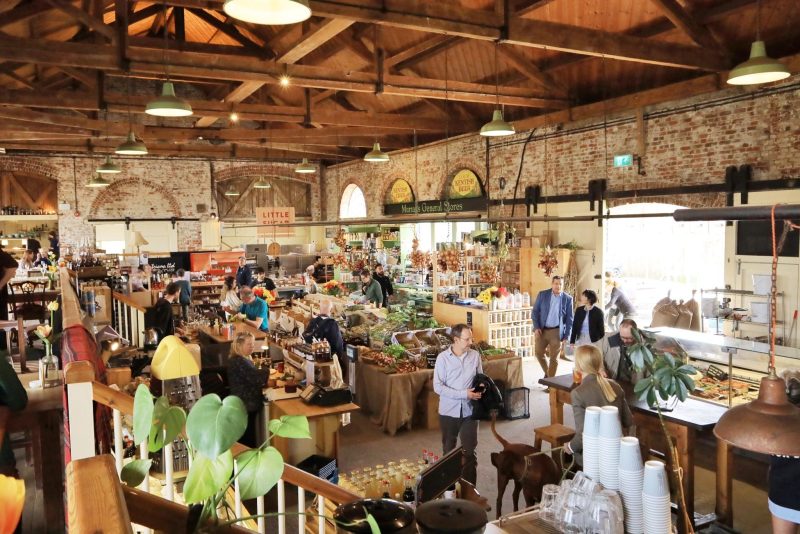
The Goods Shed, Canterbury
That table of food was her inspiration for The Goods Shed which stocks a wide range of foodstuffs and has a friendly very lively atmosphere.
The story of The Goods Shed is that Susanna and Ivon had been looking for a restaurant space in Canterbury for ages. One day they spotted the derelict goods shed in what was then a dead-end road and climbed in, quickly realising the potential.
Faversham Life has been eager for some time to learn about her latest enterprising venture – The Goods Shed Farm located in Badlesmere, a couple of miles from Faversham.
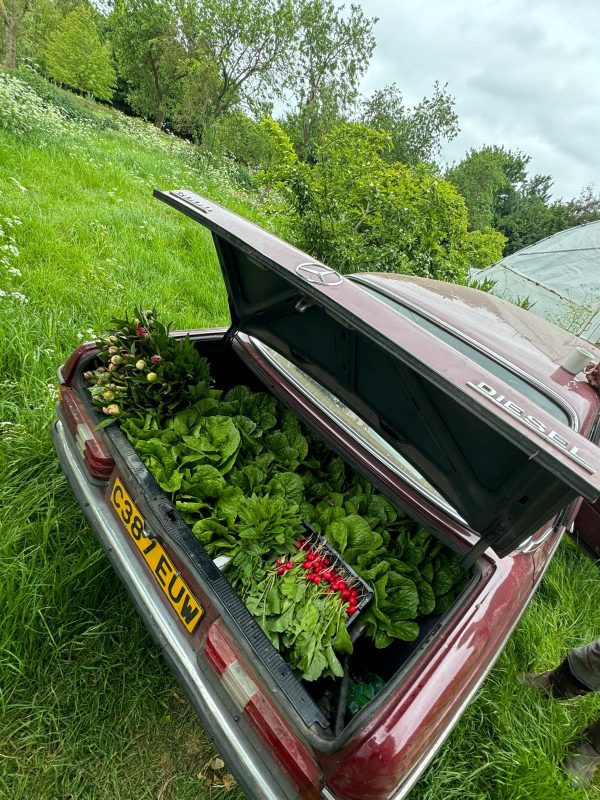
The car boot brimming with delectable produce destined for The Goods Shed
‘We want to grow food with minimal input and sell it directly to the consumer. It is a gentle touch to respond to the soil, totally chemical-free, and build community back into food production.’ On a small scale Ivon has already been doing this for some years, growing flowers, radishes, lettuces and cucumbers on the six acres around her farmhouse and in a polytunnel. Susanna and Ivon harvest the produce early in the morning to sell later that day at the Goods Shed. There is a beguiling picture on the farm’s Instagram feed of their car boot brimming with produce as she sets off for The Goods Shed. This is a daily occurrence in the summer months.
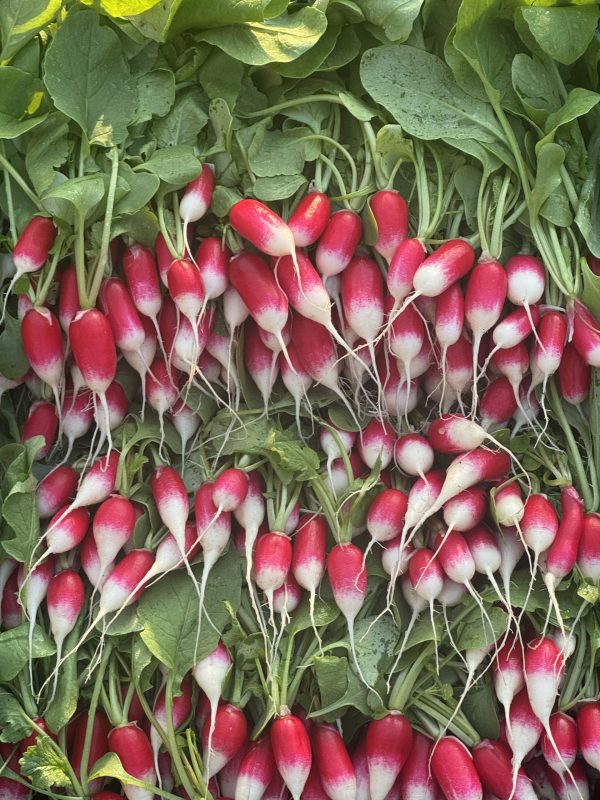
Freshly picked radishes off to market
When a hundred acres abutting her farmhouse was put up for sale it proved irresistible. (It was once the centrepiece of a 450-acre farm on the Lees Court Estate.) However, the soil was dismally compacted after decades of being subject to modern arable farming practices. Now just a couple of years on, the local gamekeeper describes it as ‘most alive’. ‘The noise of the skylarks is insane,’ says Susanna. To improve the quality of the soil for the veg patch, pigs were let loose to rootle around. Next it was then ploughed and drilled with a combined barley and pea crop. A magic ingredient all over the farm is pony poo which is widely spread around.
The farm has been divided up into ten acre sections planted with a wide variety of trees and plants: there is a woodland of native specimens including beech, oak, hawthorn and sweet chestnut; an orchard (bought from Edible Culture in Faversham) bursting with what were once more widely grown but today are rarities such as damsons, quinces, Bramleys and medlars, ‘ the cheeseboard specials,’ says Susanna. Another section grows horticulture, flowers, lots of different herbs, beetroots, spinach and many other vegetables. She is also very proud of the Heritage wheat which grows much taller than the wheat we have all become accustomed to seeing and has a wonderful willowy habit of gently swaying in the wind.
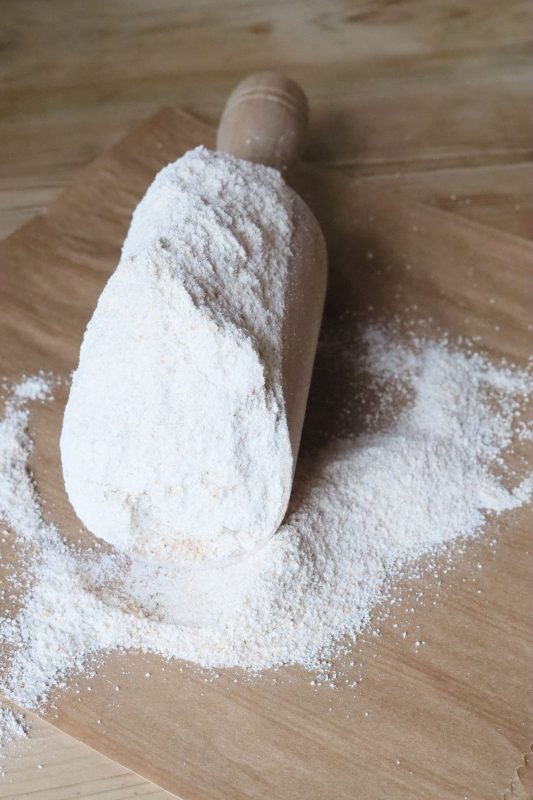
Heritage flour
The lucky Tamworth and Oxford sandy and black pigs really are in clover as they eat pig food made with the farm’s sainfoin legumes and wheat. There are also sheep and there are long term plans to introduce cattle.
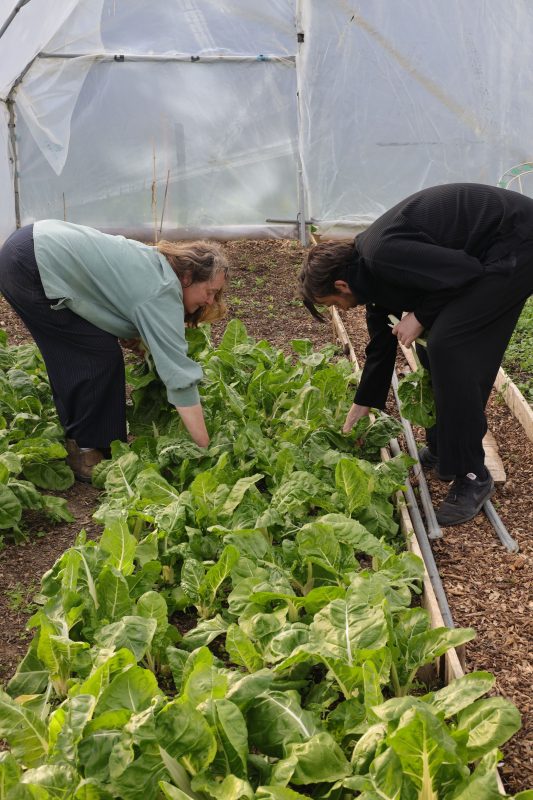
Susanna and Stevie Parle, the chef harvesting for his new London restaurant Town
It is all about ‘localising’. Over the past decade there has been a burgeoning enthusiasm for eating local produce. So much so that increasingly restaurants and gastro pubs now proudly proclaim where their ingredients are reared/grown. Susanna believes ‘if London restaurateurs are doing this the public will follow.’
‘We want to build a community around the farm’. Two candle-lit dinners on the farm are planned on 21st June, the Summer Solstice, and 19th July, with seasonal produce cooked by The Goods Shed chef. The photographs of last year’s dinners look utterly idyllic. ‘We carefully choose the location, cutting out a very small section of whatever is growing in that particular spot to make room for the long trestle tables.’
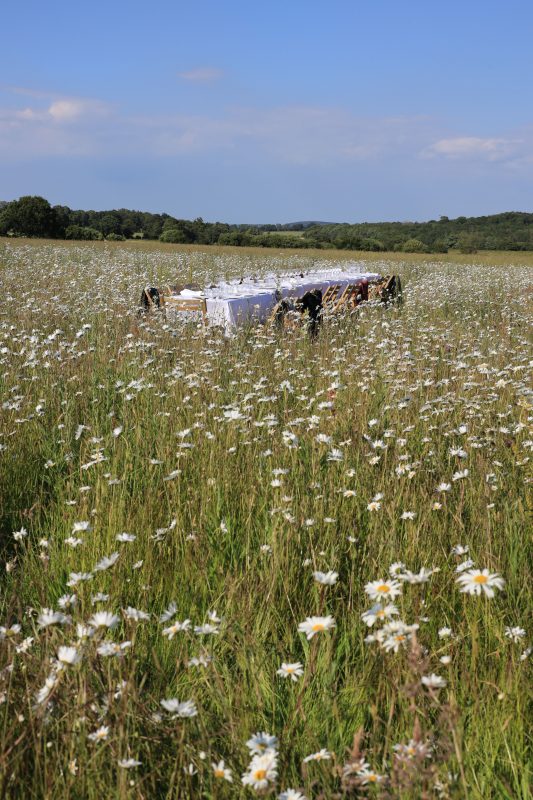
Idyllic summer dinners on The Goods Shed Farm
Susanna dreams of growing farm communities. If you would like to get involved please email: enquiries@thegoodsshed.co.uk
I am sure the Goods Shed Farm will be as much of success as The Goods Shed itself has been.
@thegoodsshed_farm